
The continental divide that has polarized America into mud-slinging camps of liberals vs. conservatives over the past few decades takes on a personal, familial note in Jon Robin Baitz’s Other Desert Cities, one of the best written, most thought-provoking, and ultimately most moving plays of the last decade, now getting a superb San Diego premiere at The Old Globe.
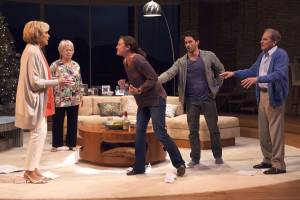 It’s Christmas Eve morning 2004, and adult siblings Brooke and Trip Wyeth, rather than heading sensibly on down the highway to the “other Desert Cities” beyond Palm Springs, have agreed to spend the holidays with their parents Polly and Lyman, the kind of folks who find Donald Rumsfeld’s visit to the troops in Baghdad “a nice thoughtful Christmas present.”
It’s Christmas Eve morning 2004, and adult siblings Brooke and Trip Wyeth, rather than heading sensibly on down the highway to the “other Desert Cities” beyond Palm Springs, have agreed to spend the holidays with their parents Polly and Lyman, the kind of folks who find Donald Rumsfeld’s visit to the troops in Baghdad “a nice thoughtful Christmas present.”
Brooke has ventured Out West from Long Island, where she earns a modest living writing articles for magazines like Gourmet and Travel & Leisure. Making her first visit “home” in six years, she has only recently recovered from years of debilitating depression, years during which Lyman and Polly watched helplessly as their daughter succumbed deeper and deeper into her personal darkness.
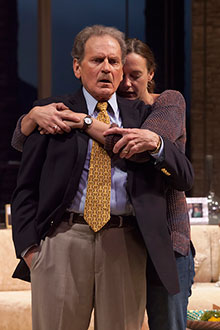
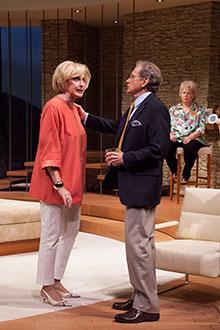
Raised the daughter of Hollywood semi-royalty, Brooke sees her movie-star-turned-GOP-chair-turned-ambassador father as having “sold out” by trading in his B-movie-stardom for right-wing politics, a move that Lyman prefers to dub “a higher calling.” (Not surprisingly, the Wyeths have counted Ron and Nancy Reagan among their closest friends.)
While Brooke went off to pursue a career in writing on the East Coast, her “ADD-riddled, junk-food-addicted., porn-surfing little brother” Trip has followed in his parents’ Hollywood footsteps, creating the hit TV show Jury Of Your Peers, a People’s Court-type reality program featuring real litigants, a retired judge (from Encino no less), and a jury made up, not of regular folks like you and I, but of actual, honest-to-goodness stars (or as Polly puts it, “some very moth-eaten, down-on-their-luck has-beens.”)
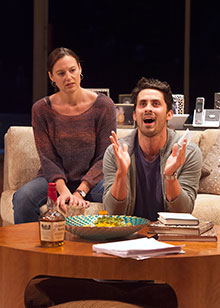 Though Brooke’s visit home might, on the surface, seem merely a long-postponed holiday reunion, she has brought along her soon-to-be-published manuscript, not the second novel her parents have assumed her to be writing, but a family memoir penned in an attempt to find answers to her many questions about Henry, the older brother “whom we can’t talk about,” who “went to war with our parents, joined a cult, disappeared, and then planted a bomb in an army recruiting center, before killing himself.”
Though Brooke’s visit home might, on the surface, seem merely a long-postponed holiday reunion, she has brought along her soon-to-be-published manuscript, not the second novel her parents have assumed her to be writing, but a family memoir penned in an attempt to find answers to her many questions about Henry, the older brother “whom we can’t talk about,” who “went to war with our parents, joined a cult, disappeared, and then planted a bomb in an army recruiting center, before killing himself.”
Polly sees it somewhat differently, viewing Henry’s death as the untimely end of a son who “was implicated in a horrific, senseless bombing in which a homeless veteran of Vietnam was burnt to death.” According to Mom, if Henry was at all implicated in the events which drove him to suicide, it was the drugs he was taking that were at fault, and not herself, Lyman, or the golden boy who was her first-born child.
Unable to stop from obsessing about why her brother and best friend jumped off a ferry into freezing water, choosing to leave his parents a note while ignoring his beloved sister in his final moments, Brooke has written her memoir as a way of putting the facts out into the open, her belief in truth-at-any-cost once again putting her at odds with her parents’ (and particularly Polly’s) insistence upon privacy-by-all-means.
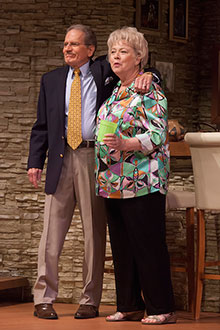 Completing the cast of characters is Polly’s recovering alcoholic sister Silda, with whom Polly co-wrote “the Hillary movies,” a hit film series now available in a boxed DVD set stretching from Here Comes Hillary to the series finale Hasta La Vista Hillary, the latter entirely penned by Silda during a feud with her sister. Reconciled at least for the time being, Polly and Silda have declared a cease-fire, though whether it will last beyond this Christmas season is anyone’s guess.
Completing the cast of characters is Polly’s recovering alcoholic sister Silda, with whom Polly co-wrote “the Hillary movies,” a hit film series now available in a boxed DVD set stretching from Here Comes Hillary to the series finale Hasta La Vista Hillary, the latter entirely penned by Silda during a feud with her sister. Reconciled at least for the time being, Polly and Silda have declared a cease-fire, though whether it will last beyond this Christmas season is anyone’s guess.
Playwright Baitz keeps Act One packed with smart, snappy one-liners that might lead unsuspecting theatergoers to think what they’re seeing is a comedy. For instance, describing her five-years-sober sister Silda, Polly quips, “The woman’s liver needs a liver,” a one-liner that would do Neil Simon proud.
If all there were in Other Desert Cities were its first act, Baitz would still have written tellingly about parents and their grown children of opposing political beliefs as he did on TV’s Brothers And Sisters. Like the Walker clan, Other Desert Cities’ Wyeths are fully fleshed out, speak with intelligence and wit, and defy easy pigeonholing.
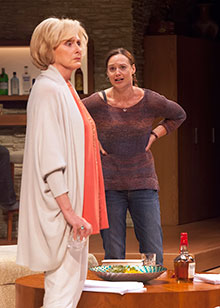 It’s Baitz’s second act that elevates Other Desert Cities from first-rate dramedy to contemporary classic, as secrets are uncovered, truths turn out to be lies, and characters we’ve thought we’ve pegged end up surprising us in ways we would never have expected.
It’s Baitz’s second act that elevates Other Desert Cities from first-rate dramedy to contemporary classic, as secrets are uncovered, truths turn out to be lies, and characters we’ve thought we’ve pegged end up surprising us in ways we would never have expected.
Old Globe vet Richard Seer directs with subtlety and finesse, eliciting all-around sensational performances from his cast, four of whom are (wonder of wonders) actual Southern California-based actors.
A superb Robert Foxworth is a leonine presence as Lyman, a role he invests with dignity, warmth, pride, and fatherly affection. Southland treasure Kandis Chappell vanishes inside the brittle, icy, manipulative Polly, yet never lets us forget that this is a wife who would fight like a tigress for her husband and might even give up her life for her children, however hatefully they have behaved. New York visitor Andy Bean is terrific (and darned sexy) as the Wyeth who has chosen L.A. as his professional base, and more significantly as the Wyeth whose attempts at peace-making and/or truce-brokering make him an essential cog in the finely oiled machine that is his family of birth. Robin Pearson Rose (of last fall’s Good People) makes it two fabulous Old Globe turns in the past year, this time as Silda, a role she lets be Act One’s “comic relief” and voice of reason before she (and the meat of Act Two’s revelations) lets us see Polly’s sister and Brooke’s aunt in a surprising new light. Most astonishing of all may be Dana Green, whose comedic gifts have been displayed in SoCal productions as diverse as La Mirada’s The 39 Steps, the Falcon’s The Psychic, South Coast Rep’s Pride And Prejudice, and the Old Globe’s Life Of Riley. Here she is positively astounding in a dramatic turn that reveals an actress of considerable power, one who digs deep to reveal the lost little girl beneath Brooke’s self-assured, self-righteous exterior.
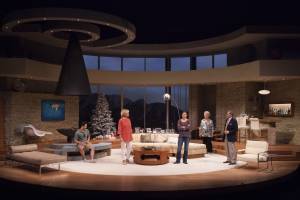 Scenic designer Alexander Dodge gives us the richly-detailed Palm Springs desert abode we’d expect Lyman and Polly Wyeth to call home, one which York Kennedy lights with utmost expertise, Paul Peterson’s sound design helping to up the dramatic ante. Charlotte Devaux’s costumes (and a pair of character-perfect wigs for Polly and Silda) reveal much about the characters wearing them before a single word has been spoken.
Scenic designer Alexander Dodge gives us the richly-detailed Palm Springs desert abode we’d expect Lyman and Polly Wyeth to call home, one which York Kennedy lights with utmost expertise, Paul Peterson’s sound design helping to up the dramatic ante. Charlotte Devaux’s costumes (and a pair of character-perfect wigs for Polly and Silda) reveal much about the characters wearing them before a single word has been spoken.
Diana Moser is stage manager and Jennifer Wheeler Kahn assistant stage manager. Casting is by Caparelliotis Casting. Other Desert Cities’ production staff is completed by Samuel Hunter (assistant director), Sean Fanning (assistant scenic designer), Michelle Hunt Souza (assistant costume design), and Amanda Zieve (assistant lighting design).
Baitz’s Best Play Tony-nominated Other Desert Cities now joins David Auburn’s Proof, John Patrick Shanley’s Doubt, Yasmina Reza’s Art and God Of Carnage, David Lindsay-Abaire’s Rabbit Hole and Good People, and Baitz’s own The Paris Letter as a play I would gladly see again and again and again. The Old Globe gives Other Desert Cities a superb San Diego premiere, one well worth a drive south from L.A., Palm Springs … or, for that matter, from other Desert Cities.
Old Globe Theatre, Balboa Park, San Diego.
www.oldglobe.org
–Steven Stanley
May 19, 2013
Photos: Snaps Studio


 Since 2007, Steven Stanley's StageSceneLA.com has spotlighted the best in Southern California theater via reviews, interviews, and its annual StageSceneLA Scenies.
Since 2007, Steven Stanley's StageSceneLA.com has spotlighted the best in Southern California theater via reviews, interviews, and its annual StageSceneLA Scenies.







 COPYRIGHT 2025 STEVEN STANLEY :: DESIGN BY
COPYRIGHT 2025 STEVEN STANLEY :: DESIGN BY